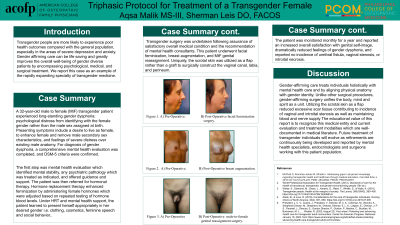Clinical: Outcomes Studies
Triphasic Protocol for Treatment of a Transgender Female
Friday, March 31, 2023
12:00 PM East Coast USA Time


Aqsa Malik, OMS (she/her/hers)
Third Year Osteopathic Medical Student
Philadelphia College of Osteopathic Medicine - Georgia Campus
Duluth, Georgia, United States
Presenting Author(s)
Introduction: Transgender people are more likely to experience poor health outcomes compared with the general population, especially in the areas of severe depression and anxiety. Gender affirming care can be life saving and greatly improves the overall well-being of gender diverse patients by encompassing psychological, medical, and surgical treatment. We report this case as an example of the rapidly expanding speciality of transgender medicine.
Case Study: Our case explores the treatment of a male to female (MtF) transgender patient following the triphasic protocol. This patient, similar to other transgender females, experienced long-standing gender dysphoria: psychological distress from identifying with the female gender rather than the male sex assigned at birth. Presenting symptoms include a desire to live as female, a desire to enhance female and remove male secondary sex characteristics, and feelings of severe distress over existing male anatomy. For diagnosis of gender dysphoria, a comprehensive mental health evaluation was completed and DSM-5 criteria were confirmed.
The first step was mental health evaluation which identified mental and emotional stability, any psychiatric pathology which was then treated as indicated, and offered guidance and support in managing transgender issues. Once the mental health specialist believed the patient had significant gender dysphoria and was prepared to move forward, the patient was then referred for hormonal therapy. Hormone replacement therapy enhanced feminization by administering female hormones which were adjusted based on repeated testing of hormone blood levels. Under HRT and mental health support, the patient learned to present herself appropriately in her desired gender i.e. clothing, cosmetics, feminine speech and social behavior.
Transgender surgery was undertaken following assurance of satisfactory overall medical condition and the recommendation of mental health consultants. This patient underwent facial feminization, breast augmentation, and MtF genital reassignment. The patient’s gender dysphoria was dramatically reduced by altering physical and sexual characteristics to reflect female anatomy along with ongoing mental health support and hormonal therapy.
Discussion: Gender-affirming care treats individuals holistically with mental health care and by aligning physical anatomy with gender identity. Unlike other surgical procedures, gender-affirming surgery unifies the body, mind and spirit as a unit. The educational value of this report is to recognize this medical entity and current evaluation and treatment modalities which are well-documented in medical literature. Future treatment of transgender individuals will evolve as refinements are continuously being developed and reported by mental health specialists, endocrinologists and surgeons working with this patient population.
Case Study: Our case explores the treatment of a male to female (MtF) transgender patient following the triphasic protocol. This patient, similar to other transgender females, experienced long-standing gender dysphoria: psychological distress from identifying with the female gender rather than the male sex assigned at birth. Presenting symptoms include a desire to live as female, a desire to enhance female and remove male secondary sex characteristics, and feelings of severe distress over existing male anatomy. For diagnosis of gender dysphoria, a comprehensive mental health evaluation was completed and DSM-5 criteria were confirmed.
The first step was mental health evaluation which identified mental and emotional stability, any psychiatric pathology which was then treated as indicated, and offered guidance and support in managing transgender issues. Once the mental health specialist believed the patient had significant gender dysphoria and was prepared to move forward, the patient was then referred for hormonal therapy. Hormone replacement therapy enhanced feminization by administering female hormones which were adjusted based on repeated testing of hormone blood levels. Under HRT and mental health support, the patient learned to present herself appropriately in her desired gender i.e. clothing, cosmetics, feminine speech and social behavior.
Transgender surgery was undertaken following assurance of satisfactory overall medical condition and the recommendation of mental health consultants. This patient underwent facial feminization, breast augmentation, and MtF genital reassignment. The patient’s gender dysphoria was dramatically reduced by altering physical and sexual characteristics to reflect female anatomy along with ongoing mental health support and hormonal therapy.
Discussion: Gender-affirming care treats individuals holistically with mental health care and by aligning physical anatomy with gender identity. Unlike other surgical procedures, gender-affirming surgery unifies the body, mind and spirit as a unit. The educational value of this report is to recognize this medical entity and current evaluation and treatment modalities which are well-documented in medical literature. Future treatment of transgender individuals will evolve as refinements are continuously being developed and reported by mental health specialists, endocrinologists and surgeons working with this patient population.
